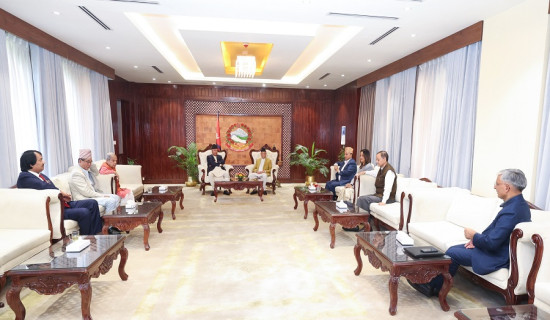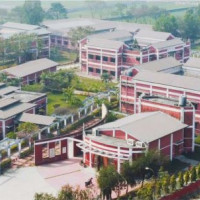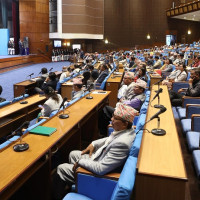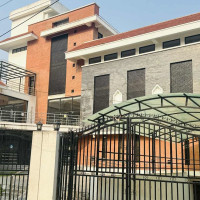- Tuesday, 24 June 2025
SAARC Material Transfer Agreement meeting opens in Kathmandu
By A Staff Reporter,Kathmandu, Sept. 12: A two-day policy round-table meeting on effective implementation of the Material Transfer Agreement (MTA) among SAARC Member States kicked off in Kathmandu on Wednesday.
SAARC Agriculture Centre (SAC) and IRRI South Asia Regional Centre (ISARC) have jointly organised the meeting.
The MTA was supposed to govern and facilitate the process of transferring seeds, planting materials and other promising biological materials among the SAARC Member States ensuring that the rights, responsibilities, and potential benefits are clearly defined for both the providers and the recipients of the materials.
The meeting holds particular significance as deliberations will focus on various aspects of the implementation of the MTA among the SAARC Member States including existing policy challenges and future pathways.
Speaking at the inaugural session, Minister for Agriculture and Livestock Development Ramnath Adhikari said that effective and expeditious implementation of the MTA is key to facilitating cross-border material exchanges, and promote innovation and invention in agricultural science. "South Asia is home to nearly a quarter of the global population and embodies cultural diversities, rich civilisational values, abundant natural resources and glorious history. Agriculture is a mainstay of economy, and livelihood of millions of people in the region," he said.
However, it is very concerning that innovation and transformation in the agro-food sector have not witnessed desirable progress in the region, he said.
"Material Transfer Agreement (MTA) provides a foundational basis for cooperation, collaboration and research among ourselves. This Agreement plays a crucial role in ensuring access for the researchers to essential resources and helping them transform their new ideas into useful innovations for communities and nations," he said.
Recalling the SAARC Member States agreed to establish the SAARC Seed Bank in 2011 to address the pressing challenge of regional food security through a collaborative approach, he said that the core objective of this Seed Bank is to forge pragmatic cooperation among our fellow Member States to ensure easy accessibility and availability of quality seeds of major food crops in the region. The Material Transfer Agreement constitutes an important element of the SAARC Seed Bank.
There will be positive and far-reaching impacts on scientific progress, protection of intellectual property rights and ethical management of common means and resources, he said.
"On the flipside, these legal frameworks are not without challenges and problems. It is challenging for us to make these agreements just, fair and equally beneficial to meet the needs of all relevant stakeholders," said Minister Adhikari.
He stressed on the policy to harmonise agreements, simplify processes, reduce administrative red-tape and address various needs of the stakeholders.
He said that discussion should be policy-focussed to protect intellectual property rights without creating impediments to mutual collaboration, strike a balance between the need of open access to information and the protection of confidential information and prioritizing ethical standards in maternal transfer process. "Our goal is to foster a collaborative environment in South Asia region where ideas and materials particularly in agricultural research and development can be exchanged freely, and
actionable outcomes can be developed," said Ganga Dutta Acharya, Senior Programme Specialist, SAARC Agriculture Centre, Dhaka, Bangladesh.
The major objectives of the meeting are to sensitize the multiple stakeholders including high-level policy makers, researchers and seed/breed producers/distributers for better understanding about MTA processes and requirements, to discuss and work towards developing a clear mechanism for effective implementation of the MTA in SAARC region and to work towards harmonizing the material transfer policies among SAARC Member States so as to enable a hassle-free cross-border transfer of genetic materials and to explore opportunities in public private partnerships in material transfer processes.
About 25 participants, consisting of the heads/representatives of National Research and Extension Systems, relevant experts from IRRI, officials from SAC and the SAARC Secretariat, farmers’ representatives (from Nepal), and relevant experts/professionals from South Asia region are participating in the two-day workshop.
Experts from IRRI, SAC and other agencies have made presentation on MTA and Seed Bank Agreements, challenges in operations and potential ways to overcome these challenges in the first day of the workshop.
















